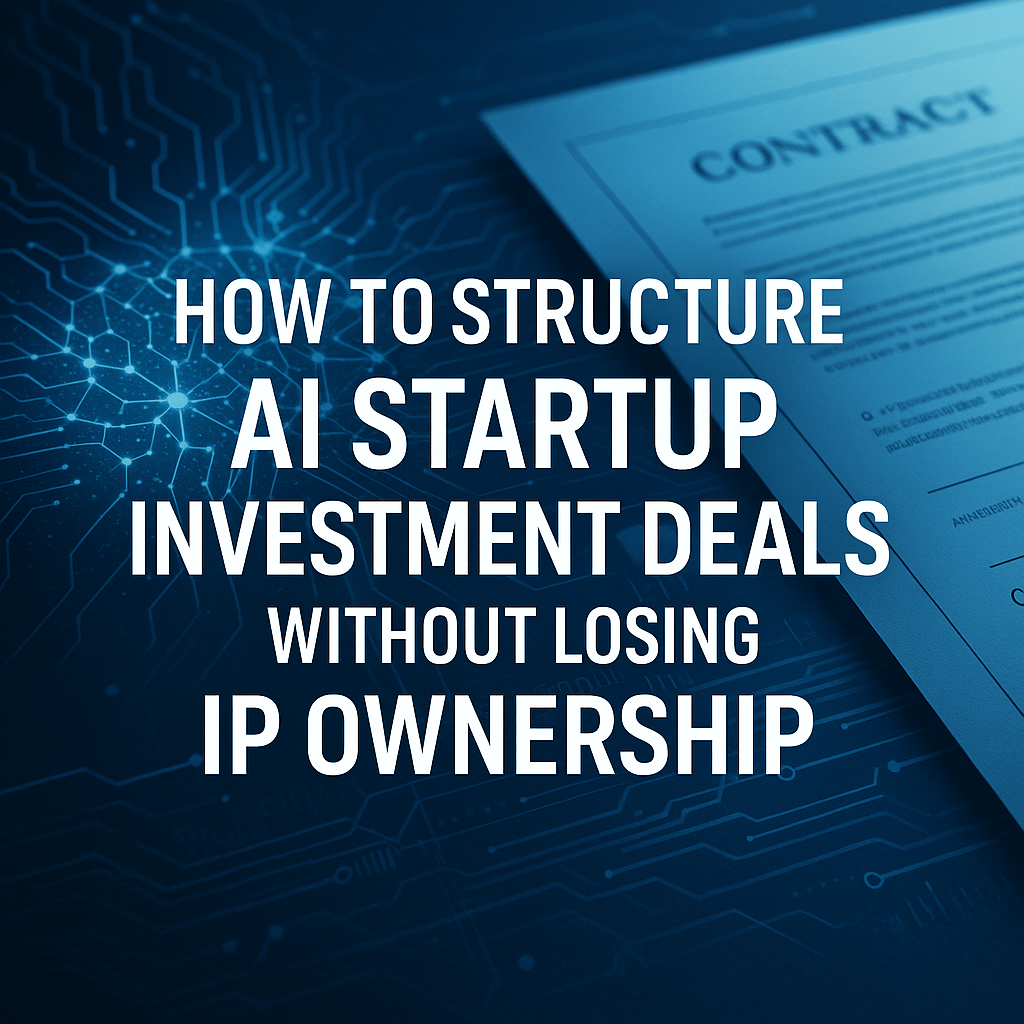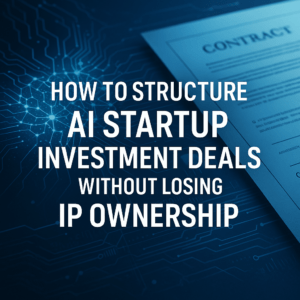Why IP Ownership Is Critical in AI Startup Investment
For founders of artificial intelligence (AI) startups, intellectual property isn’t just a legal formality — it’s the business itself. Your training datasets, machine learning models, proprietary algorithms, and novel applications are the core assets driving valuation, competitive advantage, and investor interest. However, when it’s time to raise capital, the structure of your investment deal can inadvertently jeopardize ownership of these assets if not carefully managed.
In this post, we break down how to structure AI startup investment deals that attract capital without giving up the crown jewels of your tech company.
What Documents Govern AI Startup Investment Deals?
Most early-stage AI startup financings are governed by one of three primary legal instruments:
- Convertible Notes: Debt that converts to equity upon a triggering event, often with a valuation cap and discount.
- SAFEs (Simple Agreements for Future Equity): A contract giving the right to future equity under certain conditions.
- Priced Equity Rounds: Investors purchase shares directly based on a negotiated valuation.
Each of these instruments can include language that impacts intellectual property control — directly or indirectly. This is especially true in SAFEs and priced rounds, where additional agreements like voting rights, protective provisions, and founder vesting may be bundled into the deal.
Key IP Clauses to Watch For in Investment Agreements
Startups often focus on valuation and dilution in term sheet negotiations, but overlooking intellectual property clauses can be disastrous. Founders should be laser-focused on the following:
1. IP Assignment Clauses
Make sure all current and future IP created by founders, employees, and contractors is assigned to the company — not to individual contributors or investors. Investors should never have a claim to the codebase, data pipeline, or model outputs unless explicitly granted through licensing or ownership transfer.
2. Protective Provisions
Watch for language that gives investors the right to approve decisions related to IP licensing or M&A activity. While protective provisions are standard, overly broad language can give investors veto power over product licensing strategies or commercialization routes.
3. Reverse Vesting and Founder Clawbacks
Reverse vesting allows the company (and indirectly, the investors) to claw back a founder’s equity if they leave or fail to meet milestones. While this can align incentives, founders should ensure these provisions don’t extend to IP ownership or create confusion over who owns what in the event of a dispute.
How to Preserve IP Control While Raising Funds
Even when giving up a portion of equity, founders can — and should — preserve full control over the startup’s intellectual property assets. Here’s how:
 Assign All IP to the Company Upfront
Assign All IP to the Company Upfront
From day one, make sure all code, datasets, and AI outputs are assigned to the company entity. This includes:
- Founders signing IP Contribution Agreements
- Contractors signing Work-for-Hire or Assignment Agreements
- Ensuring no personal GitHub, storage, or third-party licensing entangles the company’s core assets
Avoid Investor Control Over Tech Licensing or Sales
Negotiate term sheets that do not give early investors approval rights over your ability to license, sublicense, or sell your technology — especially when you’re still iterating. If these rights are included, narrow them to “change of control” events or high-dollar deals only.
Don’t Overpromise IP in the Pitch Deck
Avoid claiming patent ownership or pending IP protection unless it’s backed by actual filings. VCs will perform diligence, and misstatements can damage credibility — or worse, trigger litigation later.
Do AI Investors Ever Get IP Ownership?
Generally, no — but there are exceptions. In some strategic AI investments, particularly those involving corporate venture arms or joint development agreements, investors may request:
- Licensing rights (non-exclusive or exclusive)
- Joint ownership of improvements or derivative works
- Access to proprietary data for model training
These terms must be handled with extreme care. Joint ownership of AI IP can create insurmountable legal ambiguities, especially when models evolve through fine-tuning, retraining, or deployment at scale. In most cases, startups are better served by licensing, not assigning or jointly owning IP.
Investor Alignment Without Sacrificing Ownership
Savvy investors understand that strong IP controls actually increase the value of their investment. When an AI startup can demonstrate:
- A clear IP chain of title
- Proper contracts with contributors
- Well-protected data rights and compliance with AI training laws
…that startup is far more likely to survive diligence, attract acquirers, and scale into a high-value exit. IP ownership and investor returns are not at odds — if the deal is structured correctly.
Common Mistakes to Avoid
Founders navigating their first investment deal often make costly legal errors. Here are a few to avoid:
- Using boilerplate SAFE templates without legal review
- Letting a co-founder keep IP rights in their personal name
- Failing to register copyrights or file provisional patents pre-funding
- Assigning trademarks or domains to individuals, not the startup
- Signing NDAs or licensing deals that conflict with future fundraising
These mistakes are avoidable. They just require strong legal counsel and early planning.
AI Startups Should Treat IP as Sacred
Your codebase, your models, your datasets — they’re not just “assets.” They are the company. A VC deal should launch your AI startup forward, not hand over the keys to the kingdom. Structuring your agreements to preserve ownership, control, and monetization flexibility is not optional — it’s essential.
For help reviewing your term sheets, cap table, or IP chain of title, get in touch today.
Schedule your confidential consultation now by visiting techandmedialaw.com or using our secure contact form.
David Nima Sharifi, Esq., founder of the firm, is a nationally recognized IP and technology attorney with decades of experience in M&A transactions, startup structuring, and high-stakes intellectual property protection, focused on digital assets and tech innovation. Featured in the Wall Street Journal and recognized among the Top 30 New Media and E-Commerce Attorneys by the Los Angeles Business Journal, David regularly advises founders, investors, and acquirers on the legal infrastructure of innovation.



